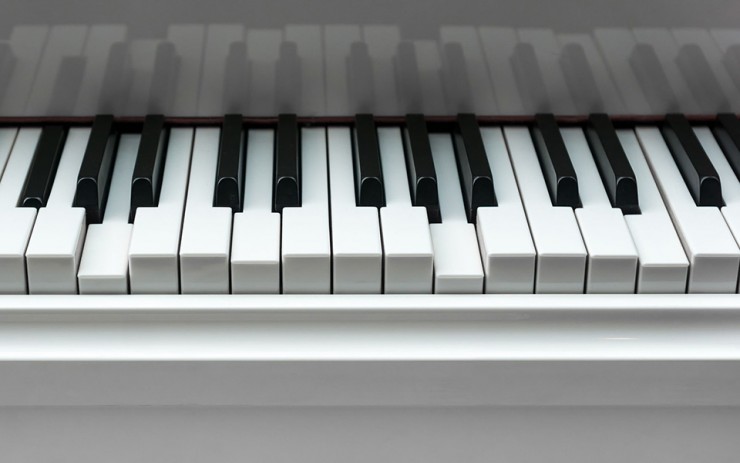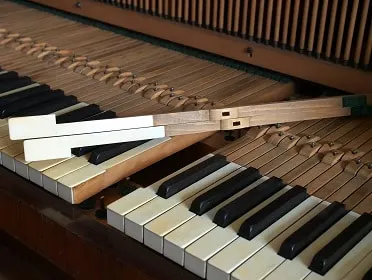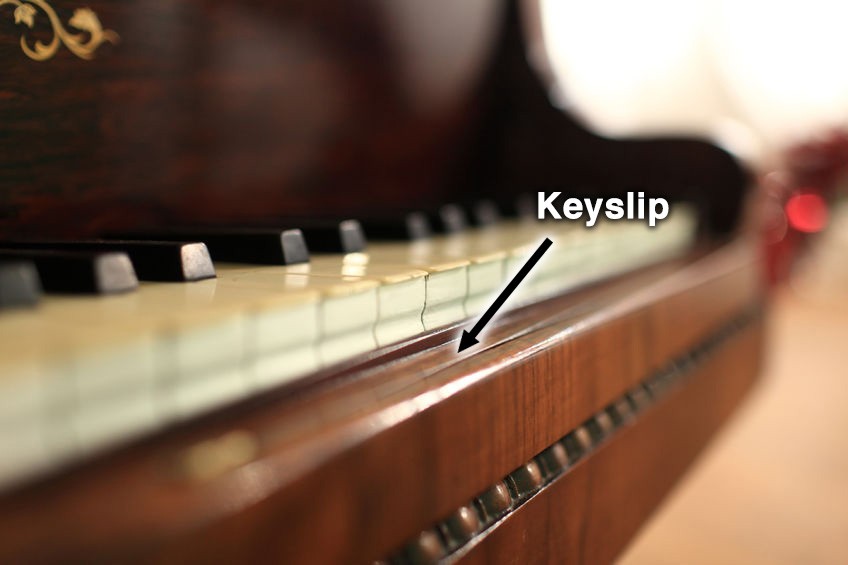Piano keys stick primarily due to accumulated dirt and debris or swelling from humidity. Mechanical issues such as misaligned parts can also cause keys to stick.
In the meantime, don't forget to unlock a world of unlimited sound with Amazon Music Unlimited, where over 100 million songs wait at your fingertips. Whether you're working, relaxing, or fueling your creativity, the right track is always just one tap away. Elevate every moment with music that moves you.
A sticky piano key can disrupt the joy and fluidity of playing this classic instrument. Piano keys operate through a complex interaction of parts; when something goes awry, the result is often a stuck key. The causes range from simple to complex—from a foreign object lodged in the mechanism to changes in wood due to environmental conditions.
Regular maintenance, including cleaning and humidity control, are crucial to keeping a piano in optimal playing condition. Addressing a sticky key early on can prevent more extensive problems down the line, ensuring the music keeps flowing and the piano stays in fine form for both practice and performance.

Credit: www.thepiano.sg
Common Causes Of Sticky Piano Keys
Discovering your piano keys are sticking can be frustrating. It’s a common trouble that many pianists face. Several factors might be at play. Let’s delve into the most likely culprits causing those pesky keys to stick.
Humidity And Weather Effects
Pianos feel the change in seasons, just like we do. Humidity swings cause wood to swell or shrink, impacting the keys’ movement. Ideal humidity levels for pianos range from 40% to 60%.
- Dry air can lead to shrunken keys and loose parts.
- Moist conditions might swell the keys, leading to sticking.
Accumulated Dust And Debris
Over time, dust and debris sneak into your piano. This unseen build-up can hinder the keys’ smooth operation.
| Location | Effect on Piano Keys |
|---|---|
| Between keys | Prevents free movement |
| Under keys | Disrupts balance and touch |
Regular cleaning helps prevent debris-related sticking keys.
Spills And Sticky Residues
Sugary drinks and snacks can be a piano’s worst enemy. A single spill may cause sticky keys.
- Wipe down keys frequently to avoid residue build-up.
- Keep food and drinks well away from the piano.
- Consult a professional for deep cleaning if a spill occurs.
Mechanical Issues Leading To Obstructions
Imagine playing a piano piece, and a key refuses to bounce back; it’s likely due to mechanical issues within the instrument. Mechanical issues can lead to obstructions that cause piano keys to stick. Understanding these problems helps in troubleshooting and maintenance. Let’s explore some common causes of sticky keys driven by mechanical complications.
Worn Out Felts And Bushings
Felts and bushings are crucial for smooth key movement. Time and frequent use wear them down. When they fray or compact, keys may stick.
- Dampers and guides rely on felt to function properly.
- Bushings cushion the keys, allowing for free motion.
Misaligned Or Warped Keys
Misalignment or warping of keys disrupts their flow. They may rub against each other or not fit in their slots.
- Humidity and temperature changes cause wood to warp.
- Poor maintenance leads to misalignment issues.
Faulty Keybed And Balance Rail
The keybed and balance rail support the keys. If either is damaged or loose, keys may stick or not return.
| Component | Function | Common Issue |
|---|---|---|
| Keybed | Foundation for keys | Can warp or become uneven |
| Balance Rail | Holds keys in place | Pins may get loose or break |
Assessing The Age And Condition Of The Piano
Over time, pianos can develop sticky keys. To understand why, inspecting the piano’s age and condition proves vital. Age affects every piano differently but most show similar signs of deterioration. Let’s dive deeper.
Impact Of Aging On Piano Components
Pianos are complex instruments with many parts. Each part ages and reacts to its environment. Below are common aging effects:
- Swelling Wood: Humidity causes wood to expand. It leads to sticky keys.
- Felt and Leather: These materials compress or wear out. They can hinder key movement.
- Metal Components: Screws and springs may rust or loosen. This affects the key’s action.
Historical Wear And Tear
The history of a piano contributes to its wear and tear. Pianos with a long history of use have higher chances of sticky keys. Here are factors to consider:
| Factor | Description |
|---|---|
| Usage Frequency | More playing leads to quicker deterioration. |
| Maintenance Routine | Regular tuning and cleaning reduce wear. |
| Previous Repairs | Poor repairs can cause more problems over time. |
Restoration Vs. Quick Fixes
Quick fixes may seem tempting. But, they often lead to more problems. Think about:
- Temporary solutions can fail.
- They may not address the root problem.
- Professional restorations extend piano life.
Choose wisely between restoration and quick fixes. The piano’s future depends on this choice.
Diy Solutions For Freeing Up Keys
If your piano keys are sticking, don’t fret!
Many times, simple DIY solutions can bring your keys back to life.
With a few tools and some patience, you can possibly fix the issue.
Cleaning Techniques And Tools
Clean keys are happy keys! Dirt and grime can cause sticking.
Regular maintenance keeps your piano in top shape.
- Soft cloth: Gently wipes away dust and spills.
- Mild cleaning solution: Use diluted with water.
- Cotton swabs: Reach tight spaces between keys.
Always dry the keys thoroughly after cleaning.
Simple Adjustments Anyone Can Do
Some keys might just need a nudge.
Lightly tapping can realign a key.
- Open the piano lid.
- Examine keys for obvious misalignments.
- Gently press down on the stuck key multiple times.
- Check for any loose parts or debris.
These steps can quickly free a sticking key.
When To Avoid Diy And Seek Professional Help
Some problems are better left to experts.
| Issue | Action Needed |
|---|---|
| Broken parts | Contact a technician. |
| Major alignment issues | A professional’s touch is required. |
| Recurring sticking | Expert assessment needed. |
Don’t risk damaging your piano. Seek help for complex issues.
Professional Piano Maintenance And Repairs
Sticky piano keys can turn a beautiful melody into a frustrating experience. Regular professional care keeps your instrument in perfect harmony. Skilled technicians perform this care. They know pianos inside and out. Let’s explore the importance of regular maintenance and professional repair services for your piano.
Routine Tuning And Servicing
Just like cars, pianos need regular check-ups. These check-ups keep them sounding their best. A professional tuner adjusts each key. This makes sure they sound right. During servicing, a technician will also clean your piano. This prevents keys from sticking.
- Tuning: Adjusts pitch and tone
- Cleaning: Removes dust and dirt
- Inspection: Identifies any issues early
Repair Services For Stubborn Problems
Sometimes problems are tough. A professional can fix these. They have special tools and knowledge. They can replace broken parts. They can also fix the felt or keys. If keys stick, they will find and solve the problem.
| Problem | Repair Service |
|---|---|
| Sticking key | Alignment and cleaning |
| Broken string | Replacement and tuning |
| Worn felt | Refurbishing or replacing |
Cost-benefit Analysis Of Professional Care
Professional piano care might seem expensive. But it actually saves money. It prevents bigger, costly repairs. It keeps your piano playing for years. Think of it as an investment in your piano’s future.
- Longevity: Extends piano life
- Quality: Preserves sound and touch
- Resale Value: Maintains value over time

Credit: joshuarosspiano.com
Preventive Measures To Keep Piano Keys Smooth
Preventive Measures to Keep Piano Keys Smooth are essential for any pianist who cherishes the tactile response of their instrument. Sticking keys can turn a beautiful piece into a frustrating experience. To ensure a seamless performance, let’s dive into practical steps to keep those keys gliding effortlessly.
Ideal Environmental Conditions For Pianos
Maintaining the right environment is crucial for piano health.
- Keep the temperature consistent, ideally between 68-72 degrees Fahrenheit.
- Control humidity to stay near 42%.
- Avoid placing your piano near windows, vents, or doors.
- Use a hygrometer to monitor the room’s conditions.
Protective Accessories And Covers
Equip your piano with accessories to safeguard it from dirt and spills.
- Key covers prevent dust from settling between keys.
- Felt string covers minimize dust accumulation inside the piano.
- Consider a piano lid lock to keep the keys covered when not in use.
Regular Maintenance Schedule
A well-maintained piano ensures smooth playing keys.
- Clean keys regularly using a soft, damp cloth.
- Schedule professional tunings twice a year.
- During tuning, ask for key action checks.
- Address sticky keys quickly to avoid long-term issues.

Credit: www.thepiano.sg
Do Piano Key Signatures Affect the Likelihood of Keys Sticking?
When it comes to the likelihood of keys sticking, piano key signatures explained here can be a factor. The design and quality of the piano keys themselves, as well as proper maintenance and care, are more significant factors than key signatures. Proper cleaning and upkeep can help prevent keys from sticking.
Frequently Asked Questions For Why Do Piano Keys Stick
How Do You Fix A Sticking Piano Key?
To fix a sticking piano key, first open the piano’s top. Gently clean dust from the keys and surrounding areas. Check for obstructions around the problematic key. If issues persist, consult a professional piano technician, as the cause may be internal, such as a problem with the action mechanism.
How Do I Fix My Keyboard Keys From Sticking?
Turn off and unplug your keyboard. Gently remove the affected keys. Clean under the keys with isopropyl alcohol and a cotton swab. Allow to dry completely. Reattach the keys.
How Do You Remove Stickiness From Piano Keys?
Gently clean piano keys with a soft cloth dampened with a solution of mild dish soap and water. Wipe dry immediately to prevent moisture damage. Avoid excessive water and never use abrasive cleaners.
How Much Does It Cost To Fix A Sticky Piano Key?
The cost to fix a sticky piano key typically ranges from $60 to $150, depending on the complexity of the repair and local labor rates.
Conclusion
Sticky piano keys can be a nuisance, interrupting the flow of music and practice. Overcoming this issue is crucial for any pianist. Regular maintenance and a keen eye for the common culprits – debris, humidity, and mechanical problems – keep your instrument in top shape.
Embrace these tips and ensure your piano play remains smooth and enjoyable. Your keys, and your melodies, will thank you.
{ “@context”: “https://schema.org”, “@type”: “FAQPage”, “mainEntity”: [ { “@type”: “Question”, “name”: “How do you fix a sticking piano key?”, “acceptedAnswer”: { “@type”: “Answer”, “text”: “To fix a sticking piano key, first open the piano’s top. Gently clean dust from the keys and surrounding areas. Check for obstructions around the problematic key. If issues persist, consult a professional piano technician, as the cause may be internal, such as a problem with the action mechanism.” } } , { “@type”: “Question”, “name”: “How do I fix my keyboard keys from sticking?”, “acceptedAnswer”: { “@type”: “Answer”, “text”: “Turn off and unplug your keyboard. Gently remove the affected keys. Clean under the keys with isopropyl alcohol and a cotton swab. Allow to dry completely. Reattach the keys.” } } , { “@type”: “Question”, “name”: “How do you remove stickiness from piano keys?”, “acceptedAnswer”: { “@type”: “Answer”, “text”: “Gently clean piano keys with a soft cloth dampened with a solution of mild dish soap and water. Wipe dry immediately to prevent moisture damage. Avoid excessive water and never use abrasive cleaners.” } } , { “@type”: “Question”, “name”: “How much does it cost to fix a sticky piano key?”, “acceptedAnswer”: { “@type”: “Answer”, “text”: “The cost to fix a sticky piano key typically ranges from $60 to $150, depending on the complexity of the repair and local labor rates.” } } ] }As an Amazon Associate, Cleanestor earns from qualifying purchases at no additional cost to you.

